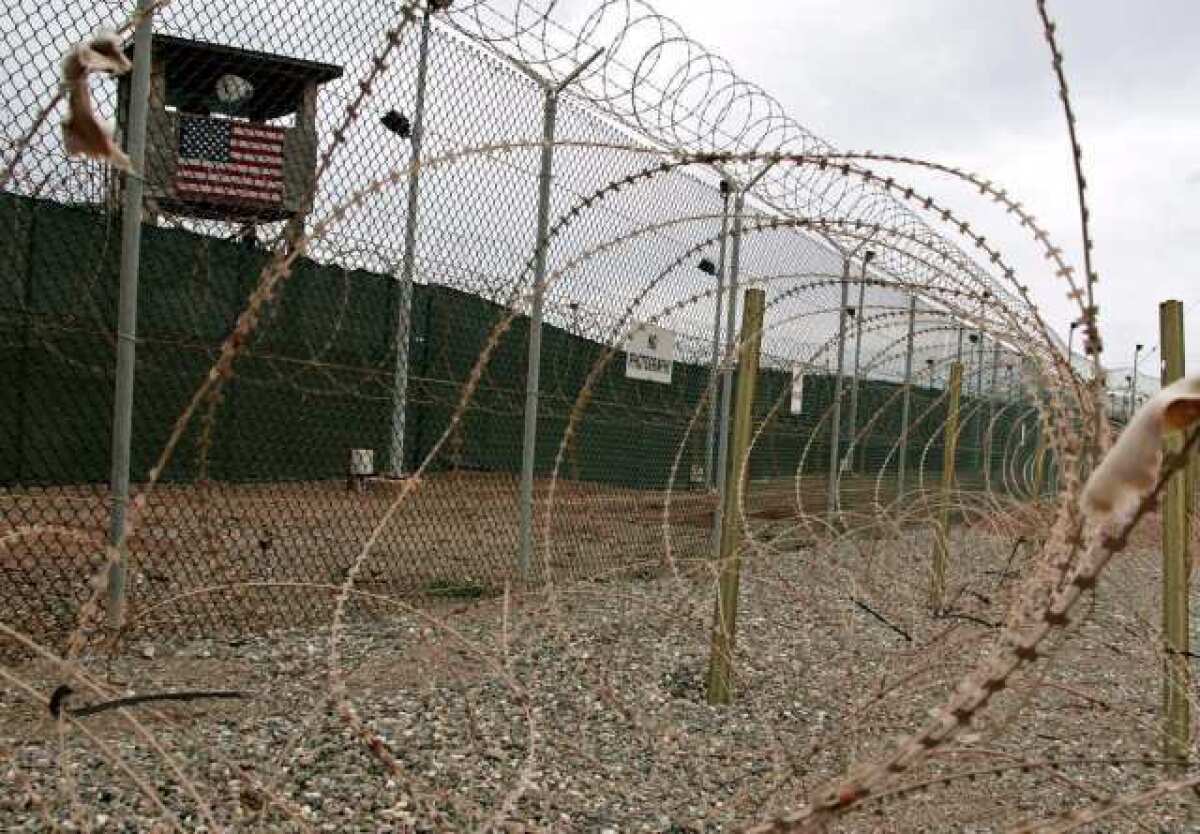America’s detainee problem

- Share via
In a conventional war, enemy soldiers can be captured and held as prisoners of war until the end of combat. In the criminal justice system, an arrest for a violent crime will lead to a charge, followed by a guilty plea or jury trial. But some individuals imprisoned in the war on terror declared after the 9/11 attacks face the worst of both worlds: detention without trial but without the consolation that they will be freed and returned to their families in a tolerable period of time.
Someone who lived in that twilight world for a decade was Adnan Farhan Abdul Latif, a Yemeni who was captured near the Afghanistan-Pakistan border in 2001 and held at Guantanamo Bay on suspicion of involvement with Al Qaeda or other enemy forces. (Latif insisted he was on a journey to seek medical care.) Latif was found dead in his cell this month. Although no cause of death was announced, Latif’s lawyer said his client had repeatedly attempted suicide and had engaged in hunger strikes. Whatever the precise cause, Latif’s lawyer said, “his death was caused by his detention.” Latif had been at Guantanamo for a decade without trial.
According to the Center for Constitutional Rights, of 167 men now confined at Guantanamo — down from a peak of nearly 800 in 2005 — 86, including 55 from Yemen, have been cleared for release yet remain at the facility. Forty-six inmates have been designated for indefinite detention because, according to the government, they can be neither tried nor safely released. Even inmates facing military commission trials — including self-proclaimed 9/11 architect Khalid Shaikh Mohammed — may not be released even if they are acquitted.
In 2008 the Supreme Court ruled that even if they didn’t receive a trial, inmates at Guantanamo had a constitutional right to challenge their confinement by petitioning for a writ of habeas corpus. But the federal appeals court in Washington, D.C., which has jurisdiction over such cases, has gutted that decision by extending excessive deference to the decisions of the government. Indeed, at the request of the Obama administration, it reversed an order by a federal trial judge that Latif be released. (The administration had appealed the decision despite the fact that, according to Latif’s lawyer, his client was cleared for transfer three times by the military and a fourth by a task force established by the Obama administration.)
Although the number of prisoners at Guantanamo has dwindled, the number of detainees could rise again under legislation passed by Congress last year. The 2012 National Defense Authorization Act purports to be a reaffirmation of the Authorization of Military Force passed by Congress to target the perpetrators of the 9/11 attacks. In fact, its reach is broader, authorizing military detention of individuals who belong to or support not only Al Qaeda but “associated forces.” Such individuals can be put on trial or detained without trial until “the end of the hostilities.”
Could that include U.S. citizens? The act says it doesn’t alter existing law relating to the detention of citizens or lawful resident aliens, but that existing law is itself unclear. In signing the legislation, Obama promised that he would “not authorize the indefinite military detention without trial of American citizens.” But that promise wouldn’t be binding on a future administration. Last week a federal judge in New York issued an injunction against the law in a case brought by journalists and activists who said they feared they might be prosecuted for exercising their 1st Amendment rights.
To ensure that U.S. citizens aren’t subjected to indefinite detention, Obama should press Congress to pass the Due Process Guarantee Act introduced by Sen. Dianne Feinstein (D-Calif.), which would clarify that a declaration of war or authorization to use military force “shall not authorize the detention without charge or trial of a citizen or lawful permanent resident of the United States apprehended in the United States, unless an act of Congress expressly authorizes such detention.”
As for foreign detainees, the administration needs to make more of an effort to arrange the repatriation or resettlement of individuals no longer considered a threat. (That would probably mean lifting the blanket ban on transfers to Yemen.) It also should reconsider the decision that 46 prisoners can’t be put on trial. As we have observed before, holding suspects indefinitely without a trial offends American notions of due process. Finally, the Supreme Court must take advantage of an appropriate case to reinvigorate its 2008 holding that inmates at Guantanamo challenging their detention are entitled to a fair hearing in a federal court. Such a reaffirmation would come too late for Adnan Latif, but it could release others from the cruel limbo of indefinite detention.
More to Read
A cure for the common opinion
Get thought-provoking perspectives with our weekly newsletter.
You may occasionally receive promotional content from the Los Angeles Times.









